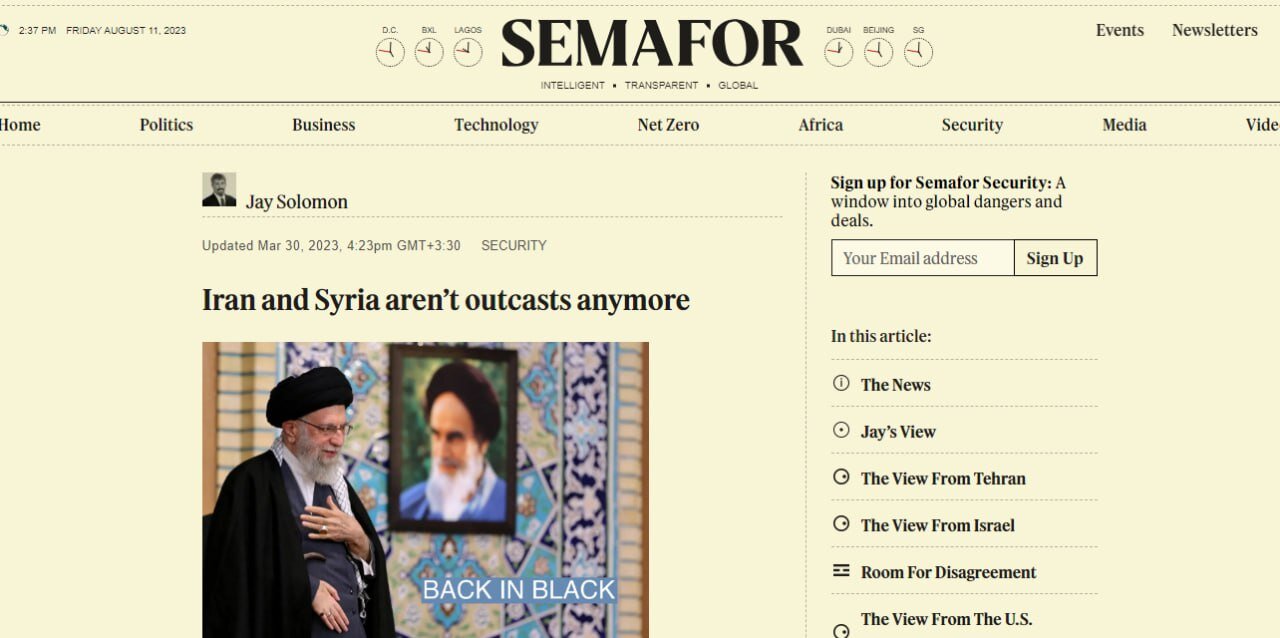Why are Arab countries getting closer to Iran?

TEHRAN- Relations between regional Arab countries with Syria and Iran have been revitalized. Many media outlets have discussed the reasons behind these renewed ties.
In a commentary on March 30, SEMAFOR website investigated one aspect of these restored ties in a report titled "Iran and Syria aren’t outcasts anymore". The report, written by Jay Solomon, the global security editor at SEMAFOR and the former chief foreign affairs correspondent for The Wall Street Journal, explained the failure of the United States' effort to isolate Iran politically.
Solomon believes that isolating Iran and its allies is essential to the U.S. strategy in West Asia. However, he thinks that the U.S. can only succeed in isolating Iran if it forms a coalition with other countries, particularly Iran's neighbors. The report also suggests that recent diplomatic developments will give Iran some breathing room.
Over the past two years, the UAE and Saudi Arabia, two influential Arab countries in the region, have been working towards normalizing relations with Syria. However, restoring ties between Syria and Arab nations is not the main issue. In 2011, Arab officials, despite fearing the spread of the Arab Spring to their own countries, supported the unrest in Syria, which turned into a civil war. It was a war in which Bashar al-Assad's government was on one side and terrorist and takfiri groups on the other.
The Arab counties' support for these groups was so clear that no one doubts it today. The cause of these events had nothing to do with Syria itself. Yet, the aim was to diminish Iran's influence in the geopolitical equations of the region by overthrowing the Assad government. Recently, there has been a shift in the attitude of Arab nations. Neither the conflict nor the rehabilitation of ties between Damascus and the Arab capitals is directly linked to the country. Yet, Iran is the subject of such policy changes.
Syria is still under Assad's rule and has not undergone significant internal policy changes despite his cooperation with resistance groups against Israel. Syria is Iran's main ally, and Saudi Arabia's attitude towards President Assad has shifted due to three main factors.
Three factors contribute to the shift in attitudes among Arabs
The first issue is related to the critical changes in the region. The conflict in Syria ended, and Iran emerged as the winner. In Yemen, despite years of war, Saudi Arabia has not been able to force the Houthis to retreat. And in Iraq, though Riyadh fiercely opposed the U.S. attack on Iraq in 2003, the regime of Saddam Hussein was toppled, and successive Iraqi governments strengthened relations with Iran. Iran's status has also been emphasized in Lebanon and Oman and other countries in the region.
Iran's opposition media, supported by Saudi Arabia in an attempt to counter Iran, did not succeed. This is a significant setback for Saudi Arabia, and continuing its aggressive approach towards Iran would only lead to further failures that could hinder the Kingdom’s Vision 2030 for economic and social reform.
The Saudi officials' approach to bilateral relations with Iran changed due to regional shifts, resulting in Iran being recognized as the most influential country in the region. After the 2019 attack on Saudi Aramco, which affected almost half of Saudi Arabia's oil production, Riyadh realized it could no longer rely on the United States for security. As a result, the old idea of Saudi security in exchange for cheap oil for the U.S. has been sidelined by recent events in the region. The United States cannot and is not willing to provide security for Saudi Arabia. Consequently, Saudi Arabia is compelled to secure itself by compromising with Iran.
The third factor pertains to global developments as the U.S. is confronting China to maintain its global dominance, while the Russia-Ukraine war has weakened U.S. power. The United States' inability to engage on multiple fronts, called American decline, has led to a reduced focus on West Asia in favor of a strong presence in East Asia and Europe. This shift has provided a lower hand for Saudi Arabia in its competition with Iran.
China's increasing global influence in West Asia forces Arab countries to adjust their approach towards Iran. Unlike the United States, China prioritizes peace in the region, leading Saudi Arabia to compromise with Iran to strengthen ties with China. Riyadh's alliance with Tehran helps maintain a balance between Saudi Arabia, the U.S., and China.
These three factors explain why the Arab countries' relationship with Iran has improved. The relationship between Saudi Arabia and Iran has also impacted this improvement. Furthermore, cooperation with its neighbors will make Iran's isolation impossible.
Leave a Comment